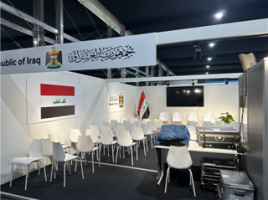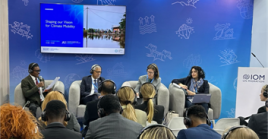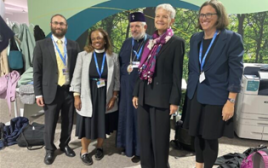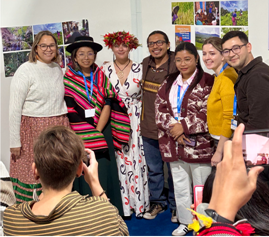In addition to the Arava Institute’s official delegation to the 2024 United Nations Climate Change Conference, current student Adam Freeman attended some of COP29. He now shares a unique review of his experience.
Among more than 80,000 climate activists in the wide halls of COP29 in Baku, Azerbaijan, I wandered between hundreds of lectures, conversations, and opportunities, experiencing something I could only dream about before.

One “forbidden fruit” made an impression on me in particular. It wasn’t on any agenda or panel — it was a personal encounter that symbolized both the potential and the limits of global cooperation. It was late — around 8:00 PM — and the pavilions were winding down for the day. My badge, free from any markers of my nationality, allowed me to roam freely. That’s when I found myself at the Iraqi booth. Despite the strong emphasis by the Israeli authorities to maintain a low profile outside our pavilion, slightly tense but curious, I started a conversation with a 24-year-old Iraqi climate activist who passionately advocated for his community.
As he warmly invited me to couch-surf at his home in Baghdad, and shared the struggles his people face with agriculture and internal climate migration, I found myself considering whether to disclose my nationality and deepen the conversation to Israeli high-tech solutions that could help his people. Just last week, the IDF intercepted an Iraqi drone near the institute — a strong reminder of the tension between our nations. The ideals of post-conflict cooperation we discussed in class felt so distant, leaving me silent because of the high tensions between our countries.
As the days went on, I tried to implement some of the tools of a political ecologist, and sense the seen and unseen. One of the most striking absences or “unseens” was that of key world leaders from nations like the United States, Brazil, Russia, China, and India. Some sent climate envoys, while others — like India — didn’t even bother to set up a booth. Was this an unspoken statement about what COP has become?

The event felt increasingly like a stage for big talk and little action. Many speeches used terms like “we should,” “must,” or “need” instead of “will,” “promise,” or “ensure.” This lack of leadership and urgency didn’t inspire much optimism, especially as the target of keeping global warming within 1.5°C drifts further out of reach. The consequences of failure were underlined at pavilions with titles like UN Migration and Human Mobility, and Disaster Risk Reduction.
Closer to home, the Middle East’s presence was similarly muted. None of Israel’s immediate neighbors had any significant presence beyond a modest Arab League pavilion. It was hard not to interpret this as another indicator of the region’s disengagement from the global climate agenda. Criticism of COP29 wasn’t confined to absent world leaders only, as activists like Greta Thunberg publicly criticized the event, accusing it of enabling greenwashing. She is certainly not wrong as Azerbaijan’s president, hosting the conference, referred to oil and gas as “gifts from God,” underscoring the contradictions at the heart of the event.
Amid these contradictions, the most meaningful moments came from individuals whose stories are often unseen. One of the most profound conversations I had was with a delegate from Pakistan who shared his firsthand experience of the climate crisis: melting glaciers in the north, devastating droughts in the south, and catastrophic flooding that has pushed families, including his own, into deep pessimism. I asked him how he sees his future, and he explained in despair how Pakistan loses an estimated $4 billion annually due to climate impacts — nearly its entire GDP. The human toll is incredibly high as farmers drown in debt, cities become unsustainable, and communities suffer from knee-deep floodwaters. Listening to him, I could feel the weight of his nation battered by a crisis they did little to cause.
Stories like his should sound a red alarm for the world. Yet, despite the growing mountain of evidence, the public — and their leaders — seem increasingly disconnected.

One panel offered an important reaction to this phenomenon. An American scientist, reflecting on 40 years of climate work, admitted that facts alone have failed to inspire action. She became a deacon of the Episcopal Church last year. She suggested that religion — something that resonates deeply with 85% of the world’s population — might hold the key to action on climate change. Her Jewish colleague, Rabbi Yonatan Neril from Jerusalem’s eco-interfaith center, has taken this approach to the next level, using social media reels to connect young people to climate justice through their faith.
Returning from Baku on my way to the Fall ’24 semester Dialogue Trip, I reflect on what this experience means for me and our community at the Arava Institute. Two thoughts stand out:
First, the voice of youth, while not politically powerful, was undeniably present. From indigenous activists to UN youth leaders, young people drew attention and sparked meaningful conversations around the conference.

Second, for many people, climate action feels like a distant, liberal cause disconnected from their lives and related to a political “side.” But framing it through religious and moral values — protecting God’s creation or combating greed can potentially mobilize far larger and more diverse populations.
Israel and Palestine, as the spiritual center of the monotheistic world, have the responsibility to lead this change.
These reflections don’t call for a change in the Arava Institute’s direction, but they highlight our potential role in this battle. We love talking about activism in our community. So, we must step out of our echo chambers and support ways to engage with our communities, whether through faith, youth, or transboundary cooperation.
